2024 IMPACT REPORT

A long legacy and a bright future


A long legacy and a bright future

Although technological innovation and medical advances have had a significant impact on dentistry over the past 137 years, today’s dental students (including the one pictured on the front cover) still learn through hands-on activities at ULSD.
With a rich history dating back to 1887, the University of Louisville School of Dentistry (ULSD) has a long legacy. However, we aren’t satisfied to rest on our laurels. Our vision is to be the benchmark for dental education, patient-centered care, and groundbreaking research — and we have the plans and people in place to achieve that vision thanks in large part to the support of our donors and partners.
Through photos and interviews, the pages ahead illustrate how ULSD has changed — and will continue to change — to meet the challenges and opportunities now and in the future. We hope these stories capture our commitment to building on our legacy and building a bright future for decades to come. MAKE A GIFT louisville.edu/dentistry/give

200 + #13 $1.5 M+
RANKING AMONG U.S. DENTAL SCHOOLS FOR NIH RESEARCH FUNDING CONTRIBUTED BY SUPPORTERS DURING THE 2023-2024 FISCAL YEAR
CONTRIBUTORS WHO SUPPORTED ULSD DURING THE 2023-2024 FISCAL YEAR
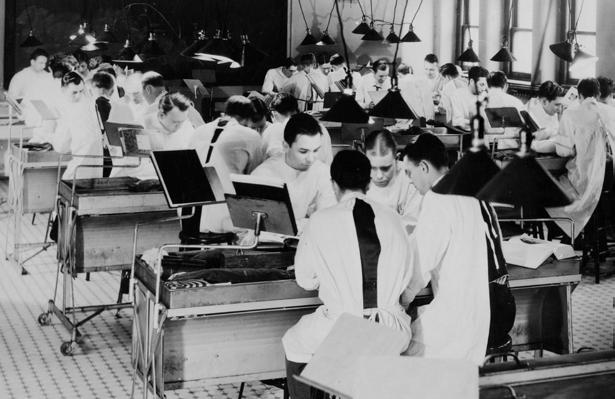
While hands-on learning has always been an integral part of dental education, as shown in this historical photo of a ULSD gross anatomy class, today’s students are more engaged in their learning than ever before.
To educate the oral health leaders of tomorrow, the University of Louisville School of Dentistry has changed both what students learn and how they learn. We continue to evolve our curriculum and teaching methods to produce dental professionals who can be leaders in a rapidly changing field today and tomorrow.
The School of Dentistry’s curriculum has evolved considerably in our 130-year history. Much of this change reflects advances in medical knowledge and technological innovation, as well as changes in market demands.
Implants are a perfect example, says Dr. Paula Collins, a 1993 graduate of ULSD’s DMD program and the school’s current associate dean for clinical affairs. “Implants were just starting to emerge when I was going through dental school, and now they are everywhere. The market demands that we keep up.”
However, there is still a need to teach the basics, says Dr. Collins. “It is a lot to cover, but we make it all fit.”
Our approach also integrates the latest technology. For more
than a decade, ULSD has been a leader in adoption of cutting-edge digital dentistry, and this commitment continues today.
In recent years, ULSD implemented a digital dentistry workflow in the preclinical curriculum. “Through these activities, students are getting firsthand experience with techniques that are becoming essential in modern practice,” says Dr. Collins.
“In our fixed course we did a crown prep of a tooth, and then we scanned it into software and then from there, we were able to digitally design a crown to be milled and printed,” says Lauren Dreese from the DMD class of 2025. “Doing that project as a D2 was absolutely incredible.”
In recent years, ULSD has also evolved how students learn the basic biomedical sciences such as biochemistry, gross anatomy, and histology. “It’s a bit different than the classic method of dental education, which taught our basic sciences in silos,” explains Dr. Margaret Hill, a 1987 graduate of ULSD’s DMD program and the school’s interim dean. “Topics are now organized based on systems.”
Dr. Hill says this integrated approach mirrors realworld clinical practice, enhancing students’ ability to think critically and apply their knowledge in patient treatment. “It’s not just about memorizing facts; it’s about understanding how everything connects to provide the best care for patients.”
In recent years, behavioral health has become a more integral part of the curriculum for future dentists and dental hygienists. “Our graduates leave prepared to embark on a career that works with the whole human being,” says Dr. Abbie Beacham, director of behavioral science for the UofL School of Dentistry. “We equip them with the skills to engage with patients on a deeper level, helping them navigate the complexities of behavior change, mental health, and overall well-being.”
In addition to evolving in terms of what students learn, we’ve also changed our approach to how they learn.
“When I was in dental school in the late 90s, most of our
didactic courses were sit and listen — not very engaging,” says Dr. Michael Metz, a 2000 graduate of ULSD’s DMD program and the current chair of the Department of Comprehensive Dentistry. “Now we are implementing active learning in the classroom such as Jeopardy for students and ‘think, pair, share’ activities where they interact with one another.”
Dr. Metz says engaging students in this way helps them better prepare for preclinical and clinical learning because they learn the material and then actually apply it.
Oral pathology is just one example of how this style of learning makes an impact.
“In the past there were so many things to memorize, and then the names of those things would change every couple of years,” says Dr. Sarah Franklin, assistant professor in the Department of Diagnosis & Oral Health. “Now we focus more on being a diagnostician — being able to develop clinical judgment. It’s a lot of presenting cases and talking through them, asking what your instinct is and how to use data to support that instinct or refute it. We practice that enough that when they’re seeing patients, they can replicate it.”
Throughout their education, ULSD students also have a strong and consistent emphasis on self-assessment. “We try to create lifelong learners,” says
Dr. Metz. “Having the ability to critically evaluate a product, figure out how it got there, and correct it if needed is the whole essence of selfcorrected learning.”
These are just some examples of how the University of Louisville School of Dentistry is empowering graduates to provide the highest quality care now and in the future. “We are preparing students to be not only skilled clinicians but also adaptive, evidencebased practitioners capable of navigating the constant advancements in dentistry,” says Dr. Metz.
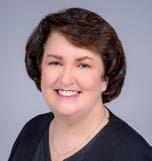
“It’s not just about memorizing facts; it’s about understanding how everything connects to provide the best care for patients.”
- Dr. Margaret Hill, interim dean
New, state-of-the art simulation clinic equipment — including mannequins that more closely mimic working on a patient using water and suction
Promotion and integration of new and emerging technologies in the curriculum
Construction of the new University of Louisville Health Sciences Simulation Center & Collaboration Hub (concept pictured at right), which will enhance the educational experience through interdisciplinary simulation laboratories
For more information, view the ULSD Strategic Plan on our website.
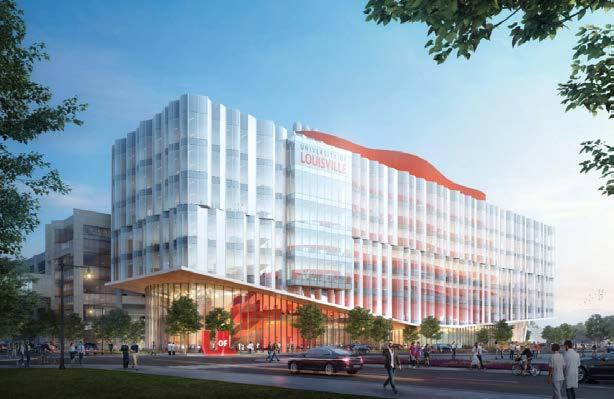
Concept rendering for the University of Louisville Health Sciences Simulation Center & Collaboration Hub
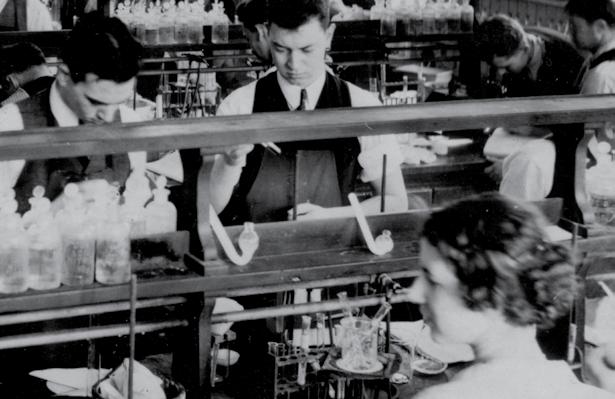
While research has always been a priority at ULSD, our school has now gained recognition as a research powerhouse where groundbreaking discoveries are taking place.
At the University of Louisville School of Dentistry, research plays a pivotal role in shaping the future of dental care. The school is committed to continuously evolving its research initiatives, embracing new technologies, and fostering collaboration between clinical practitioners and researchers.
Our drive for innovation at the University of Louisville School of Dentistry is reflected in the research topics pursued, the research methods used, and the impact this research has on oral health care around the world.
“Among all dental schools in the United States, UofL is 13th in the nation for National Institutes of Health (NIH) funding,” says Dr. David Scott, associate dean for research and innovation. “This speaks to the quantity and quality of research taking place at ULSD.”
While our largest group of researchers focuses on microbiology and associated inflammations, we are also at the forefront of research in other areas such as oral radiology.
One of the most exciting frontiers in dental research is the integration of artificial intelligence (AI) into clinical practice. In recent years, ULSD students and residents have been testing AI systems, with a focus on their application in dental imaging.
For example, as part of the Summer Research Program, one group of students compared the accuracy of AI-driven software with that of trained human observers in detecting dental caries on X-rays. “When a dentist looks at so many radiographs a day, we get eye fatigue. All the gray values you see on the image can start running together and merge. AI doesn’t suffer from eye fatigue,” says Rachel Scaglione, a DMD student involved in the study.
Dr. Gustavo Santaella, predoctoral program director for radiology, says the use of AI in imaging aims not to replace the expertise of dental professionals, but rather to enhance their diagnostic capabilities. “Providing them with additional data points to consider assists clinicians in making more accurate and timely diagnoses,” says Dr. Santaella. “It optimizes their time and their skill, pointing out areas that might need more attention.”
Another imaging technology being explored at ULSD is tomosynthesis, which creates 3D-like images from a series of 2D X-ray images. “This technology is FDA cleared and is already widely used in areas such as mammography,” says Dr. Santaella. “Now
we’re looking at how it can be applied in dentistry to improve diagnostic accuracy.”
In the past year, ULSD expanded our ability to support interdisciplinary research by acquiring a microCT unit — a high-resolution computed tomography imaging tool that allows for non-destructive analysis of small samples. This technology is already being used across multiple departments for groundbreaking research.
“The ability to image bone structures and teeth with such high resolution is revolutionizing how we understand disease progression and treatment options,” explains Dr. Scott. The micro-CT’s ability to produce 3D images with remarkable detail is a game-changer for research in fields like oral immunology,
where it’s being used to study bone loss, and endodontics to help map the internal anatomy of extracted teeth.
Alongside technological advances in imaging and AI, the school’s research initiatives are also delving deeper into molecular biology and the oral microbiome. “There are so many revolutions in molecular biology that let us look at more and more detailed signals related to microbe-associated diseases,” says Dr. Scott, highlighting the ongoing leaps forward in understanding the microbiological basis of many oral diseases.
Dr. Richard Lamont, chair of the Department of Oral Immunology & Infectious Diseases, says research in this area has the potential to revolutionize diagnostics and
treatment protocols, which could ultimately fuel advancements in personalized dental care.
“Previous research on the link between the oral microbiome and Alzheimer’s disease has fundamentally changed how dentists and researchers think about both oral health and Alzheimer’s, opening up new possibilities for treatments,” says Dr. Lamont. “Adding a personalized element is a natural progression. Our research is pointing us toward areas where we can diagnose chairside what’s going on in an individual person.”
For example, he says, dentists could use microfluidic devices to measure biomarkers in a person’s saliva to give them an indication of the risk for periodontal disease or inflammatory diseases like Alzheimer’s or diabetes. This would allow the dentist
to intervene earlier and tailor treatments to the individual.
Other research projects at ULSD include studies related to tobacco and cannabis smoking, antimicrobial peptides, cobalamin (Vitamin D), Vitamin A and retinoic acid, salivary gland dysfunction, and much more.
Ultimately, the goal of this research is to empower dental professionals with proactive and personalized approaches. “We want to be part of discoveries that fundamentally change how dentistry is practiced in the future,” says Dr. Lamont.
As a result, ULSD is positioning its graduates to not just excel as clinicians today, but also to be leaders as the profession of dentistry continues to evolve in the future.

“We want to be part of discoveries that fundamentally change how dentistry is practiced in the future.”
-
Dr. Richard Lamont,
Delta Dental Endowed Chair of the Department of Oral Immunology & Infectious Diseases
Expanded areas of interest, particularly in clinical and translational research — including translational research opportunities for students embedded with the predoctoral dental, dental hygiene, and graduate programs that support clinical research and may lead to clinical trials
Additional use of high-tech molecular biology tools to examine the bacteria involved in periodontal disease, caries, and other oral health problems
Continued research on cutting-edge imaging equipment — including technology currently unavailable outside the university — and the use of artificial intelligence in dentistry
For more information, view the ULSD Strategic Plan on our website.

Assistant Professor of Radiology and Imaging Sciences Dr. Gustavo Santaella shows ULSD’s newly acquired micro CT machine to a visitor.
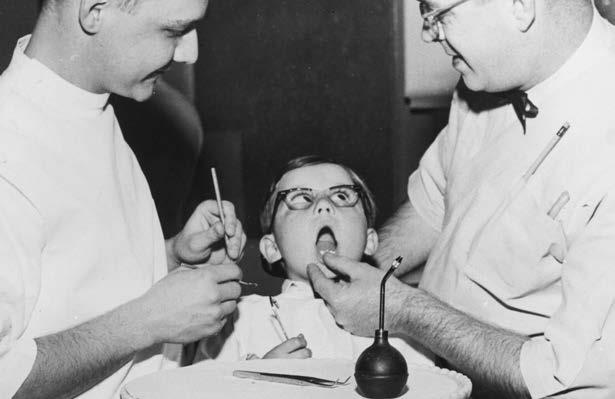
While hands-on patient care has always been part of our educational process, ULSD has developed new ways to expand the number and variety of student experiences.
At the University of Louisville School of Dentistry, we believe everyone deserves access to the highestquality dental care. By offering a vast range of clinical experiences, the school ensures that students are ready to handle the challenges of real-world patient care, particularly in underserved communities.
More than at any time in our school’s long history, today’s ULSD students and residents have the opportunity to learn through providing hands-on care to a large and diverse patient population.
In addition to the clinics located at 501 S. Preston Street, ULSD operates several patient care locations across Louisville and the Commonwealth of Kentucky. These sites provide students with valuable opportunities to engage with patients population from various cultural, socioeconomic, and linguistic backgrounds.
“Our patient pool is varied and includes people from all walks of life, from all over the world,” says interim dean Dr. Margaret Hill. “This provides tremendous opportunities for students to engage with patients who have a wide range of needs.”
This broad range of experiences not only enriches students’ clinical training but also helps them gain a deeper understanding of the complex social and behavioral factors that affect health outcomes. The school is also furthering its mission to improve the oral and overall health of those whom we serve by expanding our efforts to “bring the practice to the people.”
Associate dean for clinical affairs Dr. Paula Collins says, “our commitment to expanding access to care goes beyond our campus. We’ve made it a priority to bring our services to communities that need them the most.”
During the 2023-2024 fiscal year, two new patient care locations were added: a general dentistry practice at the Goodwill Opportunity Campus in West Louisville and a partnership with Community Dental Clinic in Owensboro. These practices are designed to enhance access to high-quality care in communities that need it most, while also providing students with valuable handson experience in settings that reflect the real-world challenges of practicing dentistry.
Dr. Hill says the value of these clinical settings is immeasurable. “We have patients who come from different parts of the world, who speak different languages and have different health experiences,” she says. “The clinics let students engage with patients in a way that expands their cultural competence and broadens their understanding of health disparities.”
the challenges of modern dentistry also includes a focus on integration of cutting-edge tools into clinical practice.
In addition to clinical rotations at ULSD-operated locations, students also participate in rotations at other sites such as the Lee and Underwood Clinic, where they care for patients with special needs. “Through these experiences, students are exposed to aspects of dentistry that many practitioners may not encounter,” Dr. Collins notes. “Student providers get an opportunity to provide care for people with complex needs, which is important and an incredibly rewarding experience.”
ULSD’s commitment to expanding access to care and preparing students for
One example is the school’s expanded use of digital dentistry in patient care. “We’re committed to giving our students the best possible exposure to these technologies, and the best possible training in their use, because we believe it’s the future of dental care,” says Dr. Collins. “Integration of digital tools not only improves the precision of care, but also helps students develop a deeper understanding of how technology can enhance diagnostic and treatment capabilities.”
The evolution of diagnostic and treatment methods in clinical dentistry is a focus for the UofL School of Dentistry.
For example, oral pathology faculty member Dr. Sarah Franklin notes that students are being exposed to advanced techniques. “The shift toward precision medicine will likely revolutionize the way oral health professionals treat conditions like oral cancer, enabling earlier detection and more targeted therapies. In the future, we may have tools that help us detect premalignant conditions before they become full-blown cancer, which would be a gamechanger in early diagnosis and prevention,” she says.
Our commitment to innovation in patient care is complemented by a broader view of the dental professional’s role in overall health. “For many of our patients, a dentist may be the only health care provider they see,” says behavioral
science director Dr. Abbie Beacham. “Dentists are often the first point of contact for health care, and that gives us an opportunity to make a real impact on prevention and early detection.” Dr. Beacham adds that it’s essential for dental professionals to understand that patient outcomes depend not only on technical care but also on patients’ ability to follow through with treatment plans. “We need to think about patient care holistically,” she says, “considering the broader social and behavioral factors that impact health outcomes.”
These are just a few of the ways ULSD is ensuring that its students are not only skilled clinicians today, but also oral health leaders of the future.
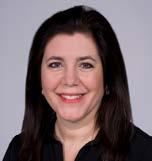
“Integration of digital tools not only improves the precision of care, but also helps students develop a deeper understanding of how technology can enhance diagnostic and treatment capabilities.”
- Dr. Paula Collins, associate dean for clinical affairs
Expanded use of digital dentistry for patient care in the DMD and specialty clinics
Expanded use of cone-beam computed tomography (CBCT) technology in patient care, including care at external clinics
Hiring of additional faculty to facilitate ideal patient-centered care and support student educational needs
Additional strategic partnerships that increase the reach and impact of our clinical activities
For more information, view the ULSD Strategic Plan on our website.
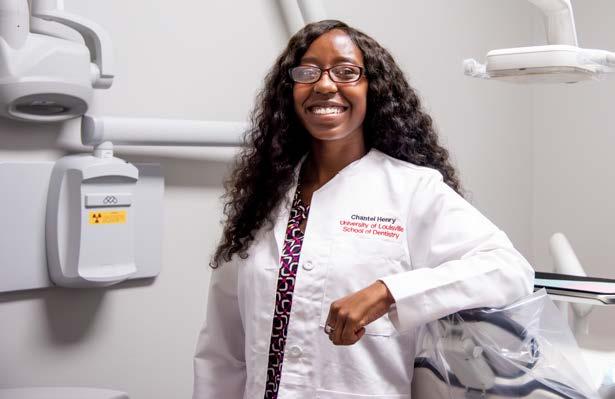
Whether at clinics within the school, other ULSD-operated patient care locations, or rotation sites, hands-on patient care remains central to our students’ educational experience.
During the 20232024 fiscal year, more than 200 donors supported ULSD with their generous contributions.
Here’s an overview of how these donors allocated their investments.
Values do not add to 100% due to rounding.
Dr. Paul Abbott*
Acadental, Inc.
Ms. Donna L. Aden, RDH & Mr. Terry L. Aden
Dr. Rocklin D. Alling & Mrs. Pam Alling
Mrs. Marian Anderson, RN
Dr. Sherry Babbage Melisizwe & Mr. Loyiso L. Melisizwe
Dr. Christopher Babcock
Dr. Gary & Allyson Ball*
Mr. Bill Barloon
Dr. Ernest A. Barnes, Jr.
Dr. Charles Barrett*
Dr. P. Gay Baughman
Dr. Joseph D. Baxter
Dr. Kenneth A. Bell & Mrs. Deanna J. Elder-Bell
Mrs. Robin R. Benningfield & Mr. Perry E. Benningfield
Dr. Matthew Bessen & Mrs. Ellana Bessen
Dr. Charles Black III*
Dr. Kevin J. Borowski
Dr. T. Gerard Bradley & Kimberly A. Bradley
Dr. David H. Braunstein & Mrs. Lisa Braunstein
Dr. Jacob H. Britt
Dr. Eric Buchner& Dr. RiCha Buchner
Dr. Bernard & Mrs. Mary Ann Burch*
Mr. Douglas Butler*

DONORS NOTED IN RED ARE MEMBERS OF THE 1887 SOCIETY
Members of the 1887 Society have made a significant investment that directly impacts the ULSD experience.
Membership in the 1887 Society is extended to supporters at the following levels:
• Annual gifts of $1000+ ($500+ for alumni within 10 years of graduation)
• $100,000+ lifetime or planned giving
In addition to this acknowledgment, members of the 1887 Society receive many courtesies, including:
• A limited-edition lapel pin
• An invitation to our annual Spirit of Giving reception
• Recognition in our ULSD Impact Report each year
For more information, visit louisville.edu/dentistry/giving/1887-society or use this QR code:

Mrs. Julianna Caggiano & Mr. Phil Caggiano
Dr. Ricardo Caicedo & Dr. Liliana Rozo Gaeth
Capricorn Foundation Charitable Trust
Mrs. Megan R. Carbello
Ms. BJ Carter & Jack Carter
Mr. Jorge L. Casanas Marrero
Dr. Raina S. Chandiramani
The Cleve H. Tandy Foundation
Dr. John Colgan Sr.*
Dr. William Cooke*
Ms. Deanna Cortright
Dr. Douglas V. Cotton & Mrs. Debra W. Cotton
Dr. Michael D. Couchot & Mrs. Lynn F. Couchot
Dr. Gary A. Crim & Dr. Susan J. Crim
Cybergrants, Inc.
Ms. Cynthia R. Davis & Mr. Mark G. Davis
Dr. Ron G. Dean
Dr. Damon DeArment*
Dr. Ralph DeDomenico*
Delta Dental of Kentucky Foundation
Dr. Ansley Depp & Mr. Robert W. Depp
DMD Class of 2024
Dr. John T. Dominici
Mrs. Jean J. Donoho
Dr. Sylvan R. Dyer & Mrs. Alice C. Dyer
Ms. Karyn P. Edrington
Elizabethtown Oral And Maxillofacial Surgery PLLC
Endodontic Associates of Louisville
Endodontic Associates of Southern Indiana
Endodontic Practice Partners LLC
Dr. Pooyan Sadr Eshkevari
Mr. Stephen G. Fairley
Dr. Amy B. Farnsworth & Mr. Kyle P. Farnsworth
Dr. Richard G. Fisher
Dr. Eugene & Dianne Foster*
Dr. Robert Fowler Jr.
Dr. Christopher J. Galea & Mrs. Andolyn R. Johnson
Dr. Dan German*
Mr. Jonathan R. Gibbs
Dr. Clay Gilbert & Mrs. Sara Gilbert
Dr. Bruce Gilmore*
Dr. Carl D. Gioia & Mrs. Diane Gioia
Mr. Martin Goins
Dr. Darren S. Greenwell & Mrs. Hollie Greenwell
Dr. Jack Groover Jr. & Mrs. Sandra Groover
Dr. Carl F. Hackney & Mrs. Leigh A. Hackney
Dr. William B. Haley II & Mrs. Linda L. Haley
Dr. Reuel E. Hamilton Jr. & Mrs. Virginia S. Hamilton
Mr. Brian Hammond
Dr. Samir N. Hanania
Dr. James M. Harlan & Mrs. Megan K. Harlan
Dr. James D. Hill
Dr. Margaret Hill & Dr. Regan Moore
Dr. Jennifer G. Hinshaw
Ms. Donna J. Hoffman
Dr. Kenneth Hofmann*
Ms. Margaret Hull & Mr. David Hull
Dr. Irene Hurst & Mr. Gabriel D. Hurst
Dr. Gary Inman*
Dr. Gregory Inman*
Dr. Nicholas S. Ising
Dr. Jean-Anne Jensen & Mr. John M. Bernardi
Dr. Hwahoon Jeong
Dr. Baxter E. Johnson & Mrs. Roberta V. Johnson
Ms. Carol Jones
Mr. David A. Jones Jr. & Mary Gwen Wheeler
Dr. David C. Jones & Mrs. Diane R. Jones
Ms. Judith P. Jones
Dr. Margaret A. Jones
Dr. William Johnson*
Dr. Richard W. Keeling & Mrs. Linda S. Keeling
Dr. Paul J. Kelly & Mrs. Kara Kelly
Mrs. Sherry L. Kennedy & Mr. David P. Kennedy
Kentucky Association of Orthodontists
Kentucky Medical Association Foundation
Dr. Zafrulla Khan & Mrs. Zareen Khan
Dr. Ralph A. Kimbrough & Mrs. Felicia Kimbrough
Dr. Matthew L. Kjar & Mrs. Rebecca M. Kjar
Dr. James J. Klemens
KLS Martin, L.P.
Kosair For Kids
Dr. Jennifer I. Kron & Mr. Jason Kron
Dr. George M. Kushner & Mrs. Diane I. Kushner
KY Section American College of Dentists
Dr. Ronald J. Lamb & Mrs. Pamela J. Lamb
Dr. Richard J. Lamont & Mrs. Gwyneth J. Lamont
Dr. Lesia J. Langston-McKenna & Mr. David H. McKenna
Dr. Joshua S. Leonard & Mrs. Heather Leonard
Dr. Lillian S. Levy
Dr. Alma Ljaljevic Tucakovic & Mr. Suad Tucakovic
Dr. James G. Loeser
Dr. Gustavo Machado Santaella
Ms. Diane M. Mahan
Dr. Jeffrey S. Marschall
Mr. C. E. Martin III & Mrs. Linda L. Martin
Dr. Joseph J. Mascaro & Mrs. Kimberly H. Mascaro
Dr. Christopher L. Mattingly & Mrs. Colette Mattingly
Dr. Jerry D. Mayfield & Marilyn A. Mayfield
Dr. Robert McGuinn & Mrs. Penny McGuinn*
Dr. William Means & Mrs. Kabrina Means
Dr. Walter L. Melvin
Ms. Paige Moore
Dr. Samuel J. Morrone
Dr. O. Wayne Mortenson*
Dr. Martha L. Munoz-Drummond
Dr. Harold D. Murdock & Mrs. Gloria M. Murdock
Mrs. Lavina M. Myers RDH & Mr. Ronald J. Myers
Dr. David C. Neal & Mrs. Lois Neal
Dr. Jimmy K. Nelson& Mrs. Heidi Nelson
Dr. Alton Neurath*
Dr. John K. Newcomb & Mrs. Shera R. Newcomb
Norton Healthcare, Inc.
Ormco Corporation
Estate of Larry J. Pack, D.M.D.
Dr. Thomas B. Padgett & Mrs. Ann M. Padgett
Dr. Sara J. Paige & Mr. Troy Paige
Dr. Philip J. Pandolfi & Mrs. Mary L. Pandolfi
Dr. David A. Park
Park Community Foundation
Dr. December D. Parker
Dr. Carolyn Parkins
Dr. Todd C. Peter & Mrs. Janet Peter
Dr. David W. Piper & Mrs. Amy Piper
Dr. Joseph R. Platt & Mrs. Lindsay M. Platt
Dr. Aaron M. Pokorny & Mrs. Monica Pokorny
Ms. Chamberlyn Pruitt
Mrs. Pamela S. Puralewski & Mr. Edward N. Puralewski
Mr. Balaji Ramakrishnan & Mrs. Kalpana Balaji
James E. Randsell Family Dental Care
Dr. Leo J. Reherman & Mrs. Cheri S. Reherman
Dr. Kenton A. Ross & Mrs. Jennifer R. Ross
Ms. Susan L. Rostov
RSMIS Foundation
Dr. Ronald W. Rush
Dr. Marija Sasek-Bautista & Mr. Mack T. Bautista
Dr. Kenneth W. Schafer
Dr. Samuel Schaffer
Ms. Jane Schlater*
Dr. Mark J. Schulte & Mrs. Virginia S. Schulte
Ms. Dawn M. Scott & Mr. Jay Scott
Ms. Laura Sellers
Dr. Richard Shawn*
Dr. J. Christian Sheaffer
Dr. Jay B. Sheats II & Mrs. Christie Sheats
Dr. Brian S. Shumway & Mrs. Rebekah Shumway
Dr. Jacqueline A. Singleton & Mr. Alan N. Singleton
Dr. David C. Small
Dr. A. Douglas Smiley
Southern Association of Orthodontists
Dr. Bob E. Spiller Jr. & Mrs. Pamela Spiller
Mr. Blake A. Stevens
Mrs. Jane Stopher RDH & Mr. William R. Stopher
Straumann USA
Dr. N. James Strull & Mrs. Nancy Strull
Dr. Carol M. Summe
Dr. Justin M. Trisler & Mrs. Kelly C. Trisler
Dr. Charles Tritle*
Dr. Sophia Y. Tseng & Dr. Dee Nishimine
UofL Health
Dr. Kimberly Vaglio
Ms. Linda C. Vaughan
Dr. Bryan J. Veal
Dr. Aaron M. Vickers & Mrs. Ashley Vickers
Ms. Warisat A. Wahab
Dr. Jason E. Walden & Mrs. Pamela C. Walden
Dr. Matthew J. Walker & Mrs. Sarah D. Walker
Dr. Jacquelyn N. Way & Dr. Gregory A. Way
Dr. Tony Wells & Dr. Crunchy Wells
WHAS Crusade for Children, Inc.
Ms. Frances J. Williams
Dr. John N. Williams Jr. & Mrs. Lucy S. Williams
Dr. Stephen Wilson & Mrs. Julia A. Wilson
Mr. Martin W. Wold & Mrs. Lauren Wold
Dr. Ariel B. Wong
Dr. James Woodward & Virginia Woodward RDH*
Dr. James G. Woodyard & Mrs. Laura M. Woodyard
Dr. David L. Wyatt & Mrs. Penny U. Wyatt
* Documented planned gift
List includes monetary and in-kind donations recorded by the University of Louisville School of Dentistry Office of Development during the 2023-2024 fiscal year covering July 1, 2023 - June 30, 2024.
Although we take great care in compiling our list of donors, there is always the possibility of error. Please accept our sincere apology if your name is not included or is listed incorrectly. Also, please contact one of our development representative listed on the back cover page so we can make a correction in future publications.


